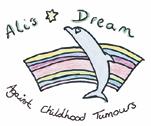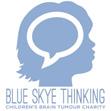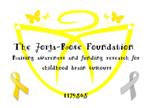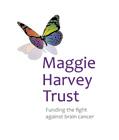

















Sue announced her retirement in the Summer 2023 issue of Believe Magazine Her difficult decision followed her diagnosis with low-grade abdominal cancer for which Sue underwent extensive surgery in September 2022.
I’d like to take a moment to reflect on the achievements and progress the Charity has made over the past 14 years, spearheaded by Sue.
Sue’s passion was born from the loss of her beloved niece, Alison Phelan, in 2001, just before her eighth birthday. Her overriding compassion and desire to help the many families she met along the way continued to drive her ambition, tenacity and commitment over the years.
In 2009, Sue led the coming together of a number of brain tumour charities to found Brain Tumour Research. The aim of the founding charities was for Brain Tumour Research to provide a sustainable level of funding across a network of dedicated Centres of Excellence throughout the UK, with £1 million per year per Centre.
The second strategic aim was to build on the successful lobbying the Member Charities had achieved to date, including the establishment of the All-Party Parliamentary Group on Brain Tumours (APPGBT) in 2005, and influence an increase in the national investment in brain tumour research to £35 million
a year in order to achieve parity with breast cancer and leukaemia, where greater levels of research investment have resulted in significant treatment breakthroughs.
We are proud that Brain Tumour Research is now the leading voice of the UK brain tumour community, influencing those with the power to drive real change and keeping this devastating disease on the political agenda. And we are delighted to have granted nearly £20 million to our Research Centres of Excellence, where scientists are working tirelessly to make the advances so desperately needed if we are to find a cure.
This progress on the pathway to a cure is thanks in no small part to you, our loyal supporters. Your fundraising and awareness-raising is crucial in enabling us to continue our vital work. Thank you for all that you do.
Sue has now taken up her role as a Trustee of the Charity. We thank her for her tireless hard work, dedication and leadership to get us this far and look forward to working with her in her new capacity.
Sue with the Brain Tumour Research teamHELP US
to continue to fund life-saving research
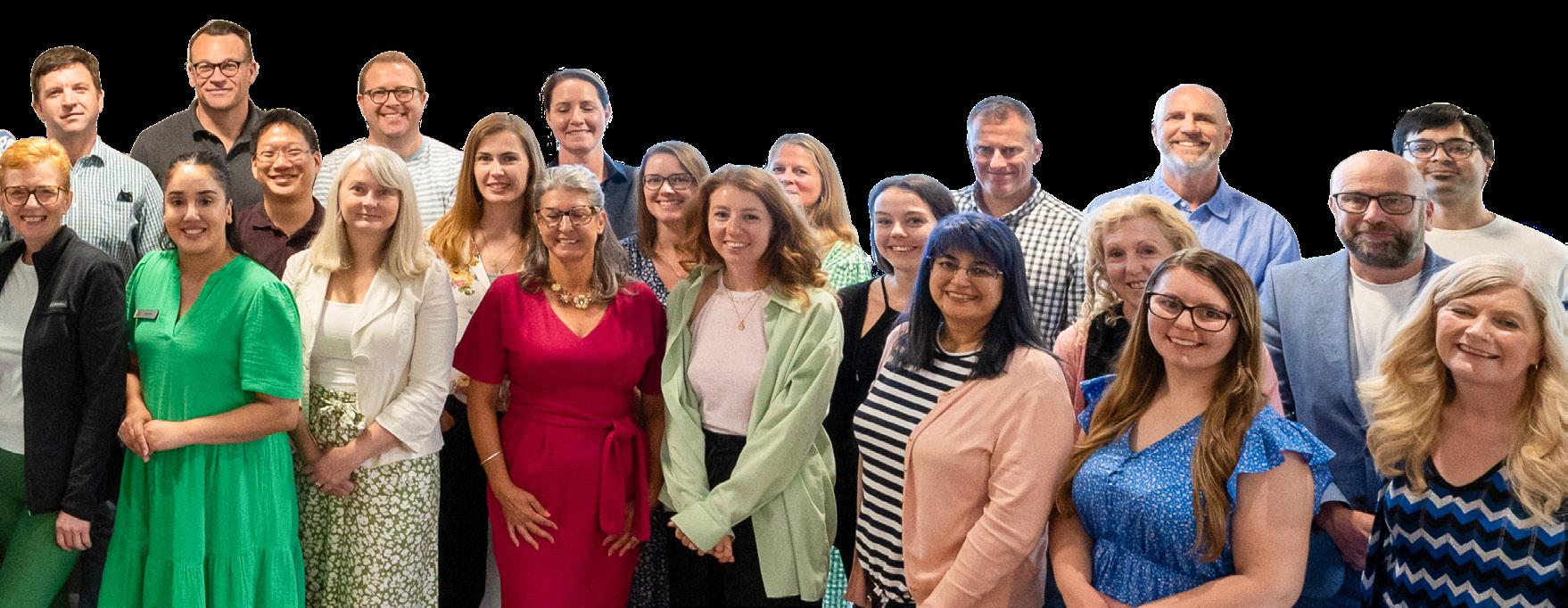


This month marks the arrival of our new Chief Executive, Dan Knowles, who joins the Charity on Monday 18th September. Dan most recently held the role of CEO of Oxfordshire Mind –a charity which experienced strong growth under his leadership – having previously worked at Director level in large commercial organisations such as John Lewis and PepsiCo. One thing that remains constant, regardless of the Charity’s leadership, is our community’s determination to achieve our vision of a cure for all types of brain tumours. Please work with us and continue to provide your support in any way you can.

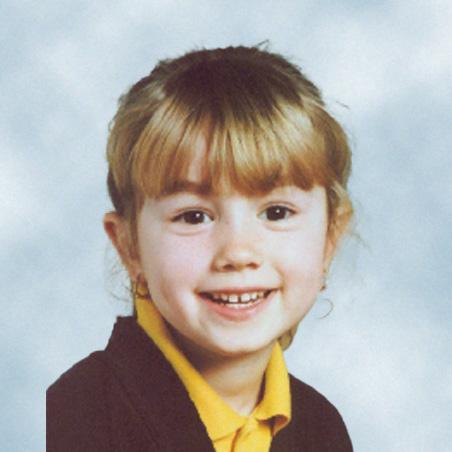 Director of Finance and Operations and Interim Chief Executive
Alison Phelan
Director of Finance and Operations and Interim Chief Executive
Alison Phelan
in three know someone affected by a brain tumourSue Farrington Smith MBE
Prof Jones and his team will identify, assess, and validate new therapeutic targets, generating the laboratory data needed to support the launch of new clinical trials to “pave the way to smarter, kinder treatments for children”.
Surrey, bringing fresh hope of a cure for the deadliest of childhood cancers.
It is a significant milestone as this is the charity’s first Centre dedicated to research into childhood brain tumours. A team led by Professor Chris Jones has ambitious plans to identify new treatments for children affected by paediatric-type diffuse high-grade gliomas, which include those previously known as brain stem glioma and diffuse intrinsic pontine glioma (DIPG), and paediatric glioblastoma (GBM). These tumours have extremely poor outcomes and a devastatingly short average survival of just nine to 12 months.
The Centre has been launched following a £2.5 million funding announcement by Brain Tumour Research – a commitment made possible by an extraordinarily generous £1 million donation
from Mary Scott, who lost her beloved husband Mike in June 2020. He had been diagnosed with a GBM the previous year. Mary said: “I count myself very fortunate that I have been able to make this large donation. It’s especially fitting as Mike adored children; to think of those poor parents whose children are affected by brain tumours is absolutely dreadful. My hope is that, with this legacy, Mike’s death won’t have been in vain, that his name will live on and that money will go some way towards finding a cure.”
We were honoured to invite Mary to officially open the lab at the launch, which took place on Wednesday 6th September.
The work complements research across our network of Centres, including at Queen Mary University of London where a paediatric hub is investigating DIPG and medulloblastoma.
Dr Karen Noble, our Director of Research, Policy and Innovation, said: “The current situation means people already facing the most distressing circumstances often have no option but to search for and fund trials abroad with all the expense, upheaval and uncertainty that brings.
“The aim is that this work will lead to trials within the next five years, so we can give real hope to families in the future. We are grateful to our loyal supporters whose commitment and hard work made this milestone possible.”
Amongst those who joined us for the launch of our new Centre were
Our fourth Brain Tumour Research Centre of Excellence has launched at the Institute of Cancer Research (ICR) in Sutton,
Aaron was seven when he passed away
Nicola Wharton and her husband Lee. Their son Aaron died in April, at the age of just seven.
Despite their heartbreak, the family has raised tens of thousands of pounds and set up a Fundraising Group in Aaron’s memory (read more on page 31). Nicola said: “Nothing prepares you for losing your child. He was robbed of his life and from being with us. It’s unbelievable that with all the advancements in so many other cancers there is so little available for those diagnosed with brain tumours and especially children. Aaron was so full of life but was lost to the cruellest of diseases.”


Our former Chief Executive, Co-Founder Sue Farrington Smith MBE, lost her beloved niece, Alison Phelan, to a glioma three weeks before her eighth birthday in 2001. She said: “Following Ali’s diagnosis, my family was shocked and horrified to discover how little funding went into research into brain tumours. We established Ali’s Dream, one of the founding Member Charities of Brain Tumour Research, to raise funds for research into childhood brain tumours.
“I am extremely proud that Brain Tumour Research is now funding this paediatric-focused Centre and that I have been able to place a tile on the Wall of Hope in memory of Ali and all those lost to a brain tumour with money raised in lieu of retirement gifts. I was honoured to attend the launch event alongside families, who like mine, know the devastation of a childhood brain tumour diagnosis and are also determined to find a cure.”
extremely generous gift in memory of Mike has enabled the opening of our new Centre

Your donations help to sustain our vital research. Set up a regular donation or give what you can today: www.braintumourresearch.org/donate-now

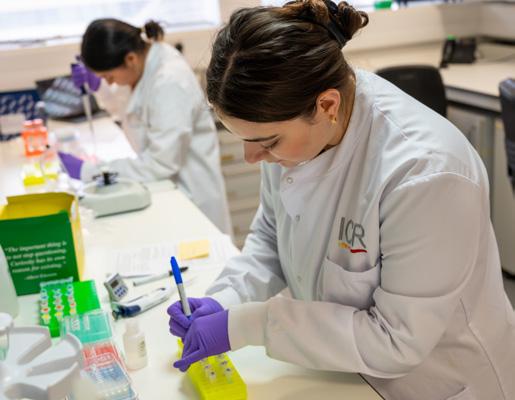
An

Neurosurgery could be transformed with the use of Artificial Intelligence (AI) technology being developed by the Brain Tumour Research Centre of Excellence at Imperial College London.

The team is working in collaboration with the Hamlyn Centre of Robotics, one of the Institute of Global Health Innovation’s research centres, also within Imperial College London, to develop a ‘bionic eye’ to help make neurosurgery safer and more effective.
Surgeons face a significant challenge in removing glioma, including glioblastoma (GBM), because these tumours are diffuse, they infiltrate healthy brain tissue and have no visible boundary. The teams are developing a tool which will use highly-advanced imaging technology to determine the boundary between healthy and diseased brain tissue, helping surgeons to remove as much tumour tissue as possible, whilst protecting vital brain tissue.

The new technology will rely on a comprehensive database of images and work to build this is already underway. An algorithm will then be trained to distinguish between tumour and healthy brain tissue, as well as identify areas of the brain which are highly functional such as those involved in speech. Together, these will go on to guide the development of a ‘bionic eye’ device to be installed in the surgical microscope for use during surgery to enable neurosurgeons to differentiate between diseased and healthy tissue.
Dr Giulio Anichini, a clinical research fellow funded by Brain Tumour Research, said: “This is an exciting development for glioma and GBM patients, and potentially to be used in other areas of neurosurgery. It allows us to be much more precise in removing diseased tissue versus healthy tissue. It also means we can determine areas of the brain which are crucial to vital functions such as speech and mobility, and those where we’d be more proactive in removing tissue around the tumour without causing lasting damage.”
The technology will assist during surgery
Innovative research to develop a set of ‘super sponges’ to deliver drugs directly to the brain following surgery for glioblastoma (GBM) is being funded thanks to a partnership between Brain Tumour Research and the Medical Research Council (MRC).


The £500,000 award will fund a project being led by Dr Ben Newland at Cardiff University to design a unique sponge-like gel to be inserted into the space left following surgery to remove GBM tumours.

The ‘super sponge’ will deliver combinations of repurposed cancer therapeutics, which are unable to pass through the blood-brain barrier, directly to the site. Not only will this novel technique reduce the effects of drugs on non-targeted areas, but it will also deliver effective treatment to the tumour cells which are left behind after surgery and go on to cause recurrence of the disease.
Dr Newland said: “This project marks the start of our journey towards a paradigm shift in brain cancer treatment. By creating a new delivery system, we aim to tap into the multitude of existing drugs and unlock their potential to thwart brain tumours. Our team draws together a range of expertise, and we are very excited to undertake this challenge to improve the outcomes for brain tumour patients.”
Dr Newland will also screen thousands of potential drugs to identify those most suited for the delivery system and those which cause the most harm to GBM cells, but least harm to the healthy brain.
This successful proposal was identified during a ‘sandpit’ event where cross-disciplinary academic experts collaborate to design innovative new projects to address cancers of unmet need. Of the four project awards made by the MRC, half are focused on brain tumours.
Dr Karen Noble, our Director of Research, Policy and Innovation, said: “We are delighted to support this pioneering work by Dr Newland and his team. We share his excitement on undertaking this challenge, which is our first partnership with the MRC and the Charity’s first major investment in Wales.”


If you haven’t already signed up for our Walk of Hope on Saturday 30th September, what are you waiting for?

The clock is ticking. Don’t miss your chance to join one of our walks taking place across the UK and step forward with a community of supporters all working towards one common goal – to find a cure for brain tumours.


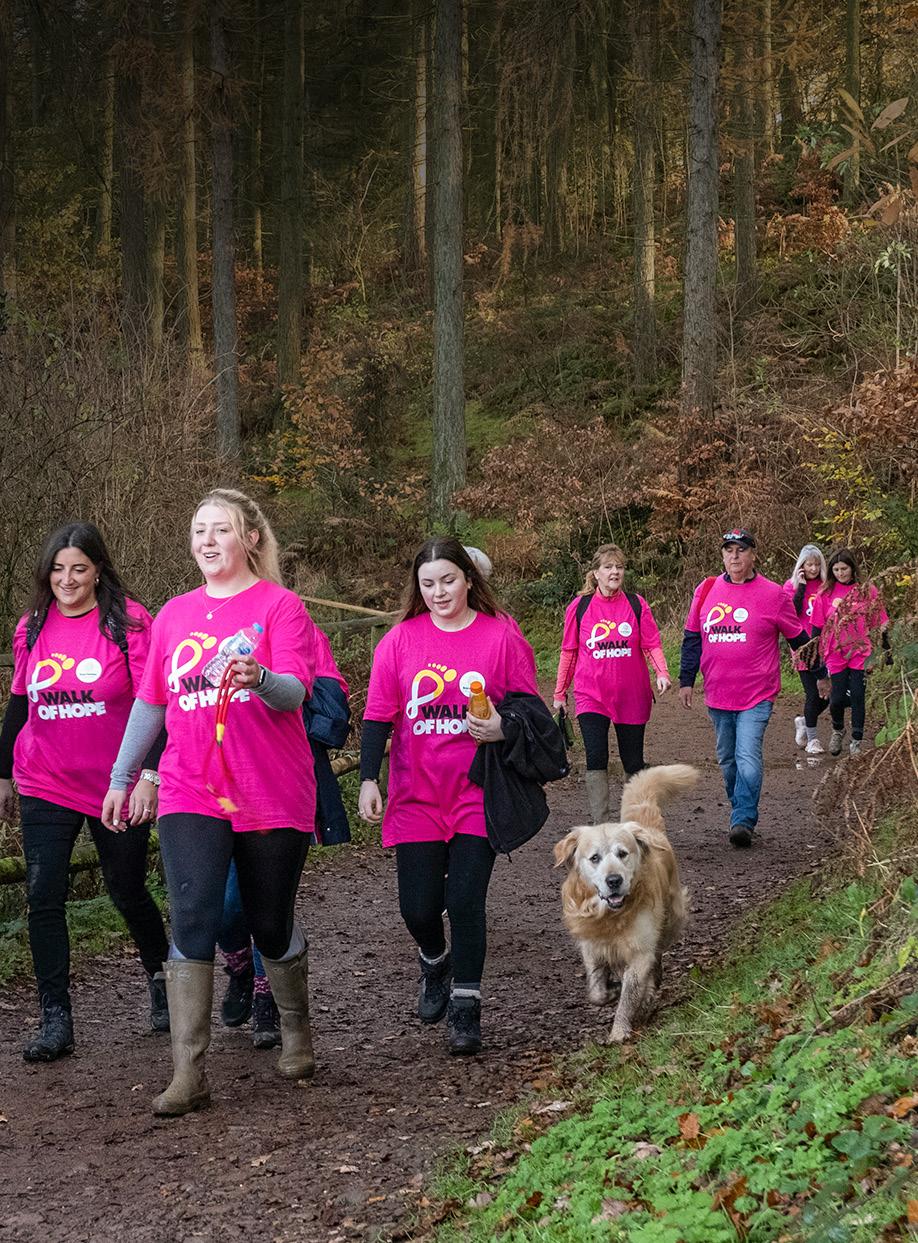
New for 2023, our flagship Walk of Hope events are taking place in Ellesmere in Shropshire, Luton in Bedfordshire, and Newcastle in Tyne and Wear, each with a festival atmosphere including entertainment as well as refreshments. These walks are being led by families who know the devastation of a brain tumour diagnosis and are determined to make a difference for future patients and their loved ones.
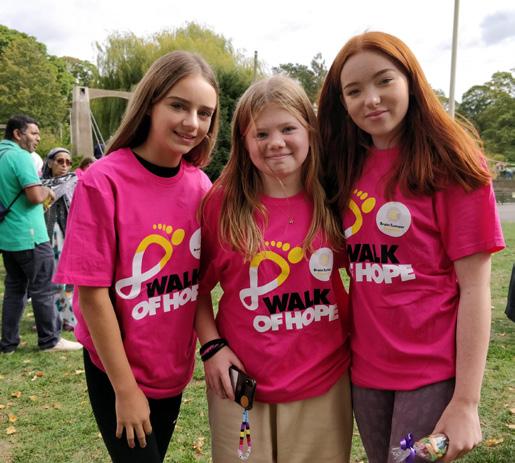
Leading our flagship Walk of Hope in Ellesmere is Aaron’s Army – a newlylaunched Fundraising Group set up in memory of Aaron Wharton – and the family of Ella McCreadie.

Aaron died from a grade 3 anaplastic ependymoma in April 2023. He was just seven years old. Ella died in her sleep from a high-grade diffuse glioma in December 2022, at the age of 13.


Aaron’s mum Nicola said: “I hope this and future events will contribute, one day, to life-saving research. That would be an incredible legacy for a little boy.”


Don’t worry if you can’t make it to any of our flagship walks as we’ll also be stepping out together in:
Chichester, West Sussex
Hamilton, South Lanarkshire
Leeds, West Yorkshire
Leicester, Leicestershire
Milton Keynes, Buckinghamshire
Stockport, Greater Manchester
Swanage, Dorset
We’re also looking forward to a flagship event at Wardown Park in Luton, which is now in its third year and played host to our biggest Walk of Hope in 2022.
Organised by the families of Amani Liaquat and ‘Gorgeous’ George Fox – both of whom lost their lives to glioblastoma (GBM) – this year, our Luton walk is also in honour of Renai Fraser who was 11 when she died in August 2022; and Shay Patel, the inspiration for Shay’s Smiles, who passed away in September 2020, aged 13.




At the Town Moor in Newcastle, Karen Guthrie will lead walkers inspired by her daughter Eleanore, who was just four when she was diagnosed with a craniopharyngioma in 2021. She now lives with the life-changing effects of her brain tumour.
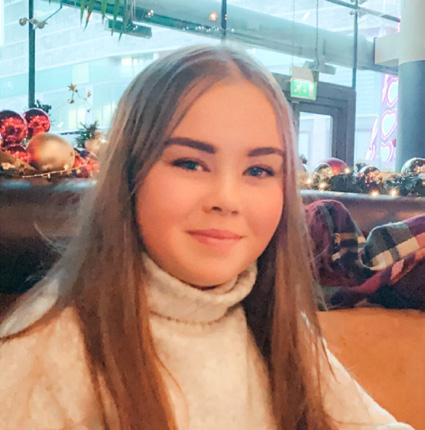
Torpoint, Cornwall
And if none of these locations are convenient, you can do your own Walk of Hope, wherever you are and whenever you can!
Join in with your family, bring your friends and make new ones as you come together with others who all have a connection to this devastating disease. Each step you take will bring us closer to a cure.
REGISTER NOW and find out how to get your branded Walk of Hope t-shirt: www.walk-of-hope.org
Tens of thousands of people have pledged their support for our petition. Now, we urgently need your help to achieve 100,000 signatures by 31st October 2023. We are calling on the Government to ring-fence £110 million of current and new funding to kick-start an increase in the national investment in brain tumour research to £35 million a year by 2028. Sign now to help us reach our 100,000-signature goal, in the hope of prompting a parliamentary debate: www.braintumourresearch.org/petition
We URGENTLY need your signature
Rachael Wood was 29 weeks pregnant with her son, Harrison, when she was diagnosed with a brain tumour, later identified as a grade 4 astrocytoma, in March 2022.

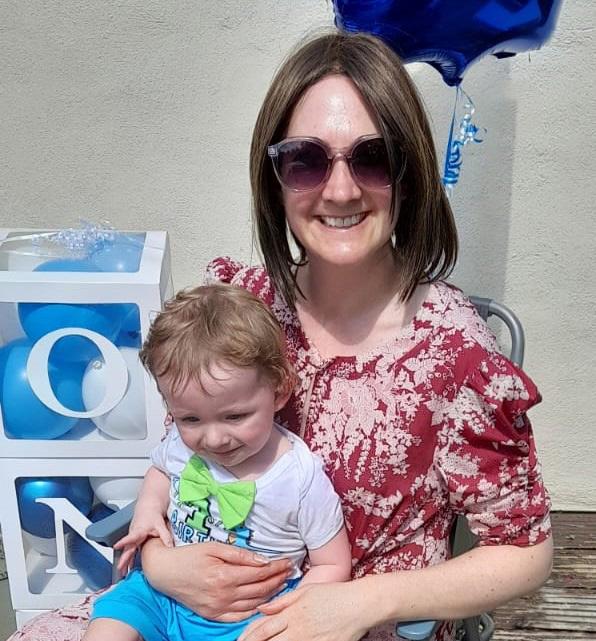
Rachael, also mum to five-year-old Bella, said: “With the current treatments available, this disease will shorten my life expectancy. At only 36, you do not expect to be thinking about the end of your life.”

She underwent a debulking surgery, followed by radiotherapy and chemotherapy.
Rachael added: “Once I was diagnosed, I was shocked to find out how many others there are like me, yet how little investment is being made to finance research. I want to be there for my children as they grow up and know my only hope lies in finding a cure. I’ve signed the petition and would encourage others to do the same because money for research is desperately needed and time is not on our side.”
Your signature can save lives
HELP US achieve
100,000 signatures by 31st October 2023
When Brooke Leavey was diagnosed with an inoperable diffuse midline glioma (commonly known as DIPG), her family felt “forced” to raise more than £200,000 to access trial chemotherapy medication in the USA to try and save her life.


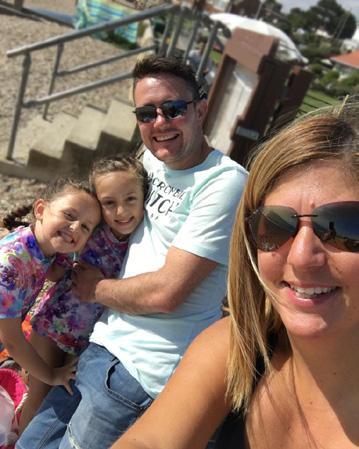

Sadly, the tumour was too aggressive and Brooke died on 14th March 2020, aged 11.
“As a family, we believe everything we did helped Brooke. We had 11 months from when she was diagnosed to when she passed away. She was a proper fighter and everything we went through was a battle. I can’t fault the compassion and support from the NHS staff,” said Brooke’s dad, Dan.
“However, I am angry. Angry that decades have passed and still people are dying from this disease, and yet treatment options for brain tumours aren’t keeping up to date with innovations in other cancers. The Government must recognise brain tumour research as a critical priority.”
Sign and share our petition to help bring hope for families like Rachael’s and Brooke’s in the future.
Hugh Adams, our Head of Stakeholder Relations, said: “For too long governments have put brain tumours on the too difficult to think about pile.
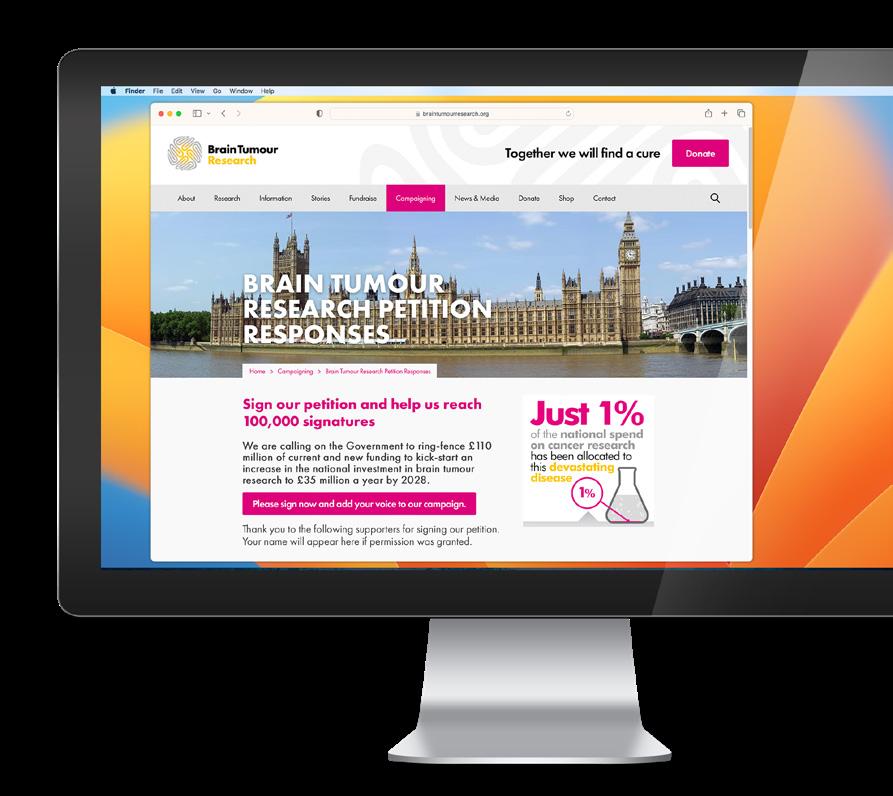
“Five years after the Government announced £40 million for brain cancer research, less than £11 million has been allocated, and patients and families continue to be let down by a funding system which is not fit for purpose.
“If everyone spares just a minute of their day to sign and share our petition, we will quickly reach our 100,000-signature goal.”
Please share our petition as widely as you can on social media and with your personal networks: www.braintumourresearch.org/petition
Brooke died aged 11 Brooke with dad Dan, mum Lisa and sister Amelia Amelia and BrookeAs the leading voice of the UK brain tumour community, our work with parliamentarians is key to raising awareness and we take every opportunity to influence cancer policy at the highest levels as we campaign to increase the national investment in brain tumour research.
So, what could be more encouraging for our community than the Health Minister Will Quince stating that brain tumours are “a priority” for him during a meeting with Brain Tumour Research
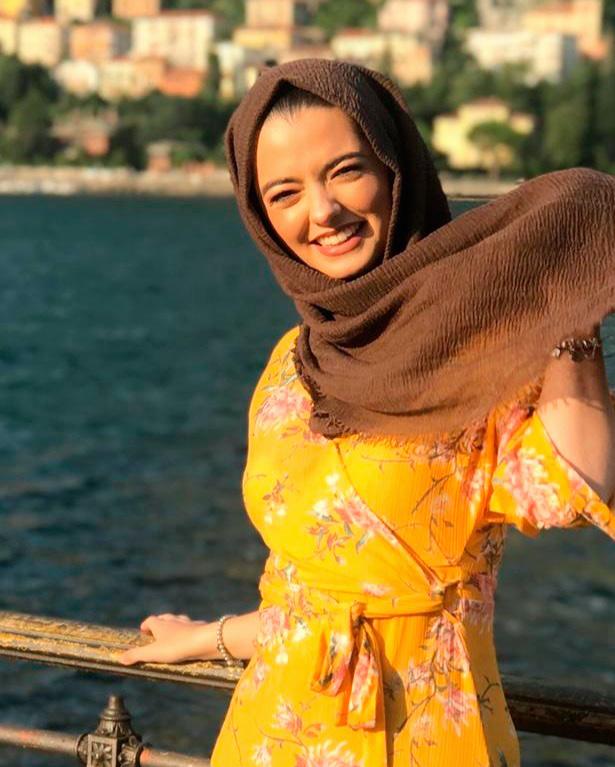
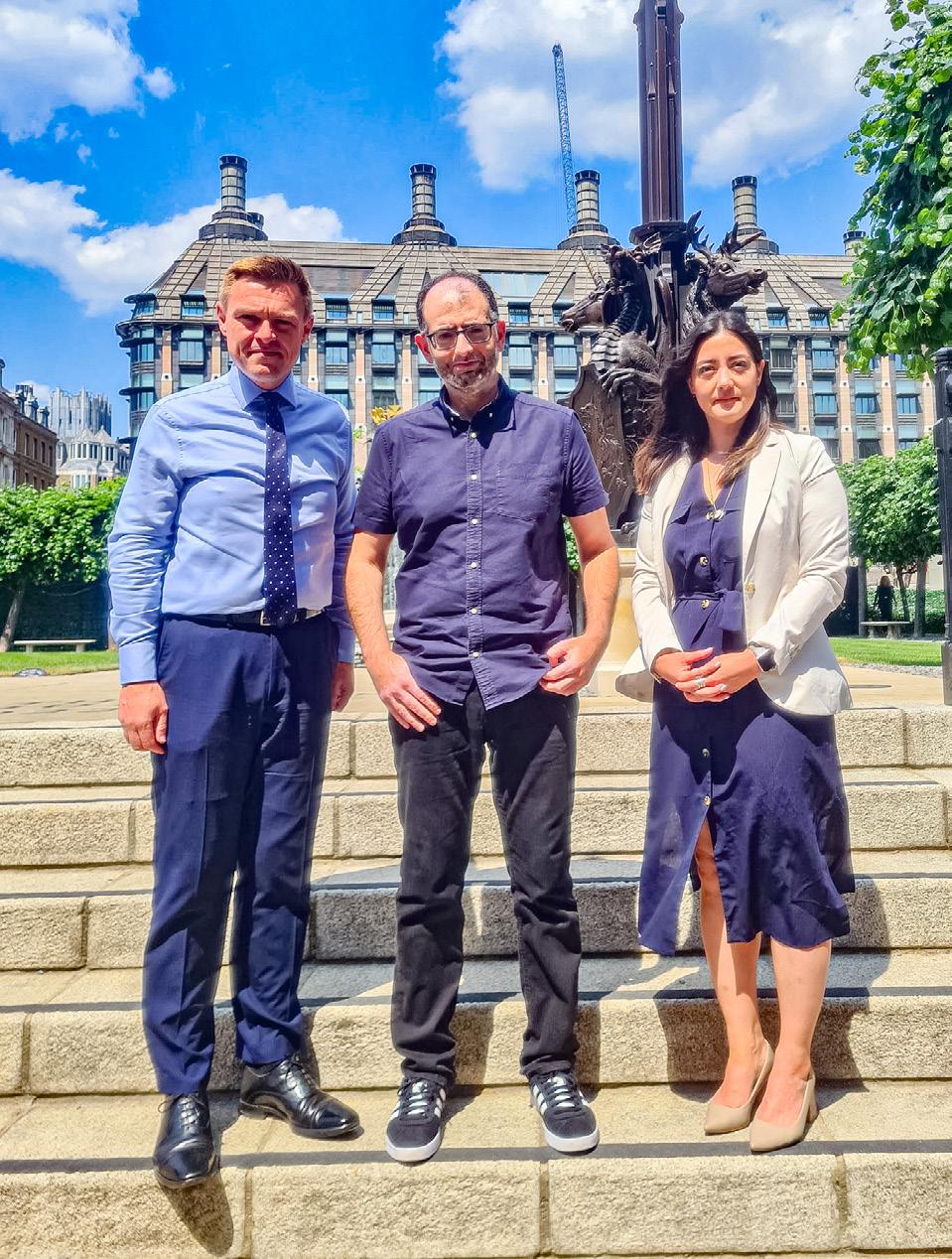
Our meeting with Mr Quince, which was facilitated by Lord Hunt of Kings Heath, came just weeks after the Minister told parliamentarians during a Westminster Hall debate how he has “spent more time on this particular issue in my time as a Minister than I have on any other condition under the umbrella of the Major Conditions Strategy” adding he will continue to do so because “there is an injustice in that this area does not get the attention it deserves”.
During our discussion with the Minister, he credited the Charity and our community of campaigners for the time he had spent on brain tumours. He said: “It’s the campaigning of not just your organisation, but also the very compelling and persuasive cases made by parents and campaigners who have experienced brain tumours, largely through loved ones – often tragically.”
One in three know someone affected by a brain tumour
Two such campaigners are Khuram Liaquat and Yasmin Stannard. They lost their daughter, Amani, to a glioblastoma (GBM), aged 23.


Khuram and Yasmin met with Mr Quince alongside their MP, Sarah Owen, to discuss the lack of funding for brain tumour research. During their conversation, the Minister made significant pledges, including to order a review of previously rejected research funding bids in consultation with experts in the field of brain tumours, and that the Department of Health and Social Care (DHSC) and National Institute for Health and Care Research (NIHR) will explore the option of having a brain tumour expert on the panel that considers applications.
Weeks later, Amani’s parents returned to Westminster to share her story at a meeting of the All-Party Parliamentary Group on Brain Tumours (APPGBT), for which Brain Tumour Research provides the secretariat. They spoke alongside Amani’s Clinical Nurse Specialist, Tanya Betts, and Neuro-oncologists, Dr Anup Vinayan and Dr Thomas Carter.

Matters raised during that meeting included compassionate access to novel therapeutics; dismay that the standard of care for GBM has not changed for 20 years; and the collection and storage of tissue samples and how this might later impact on genomic testing. We will encourage supportive MPs to take these issues forward.


Hugh Adams, our Head of Stakeholder Relations, said: “We take every opportunity to make our voice heard and to challenge the status quo, because for too long, our community has been let down with brain tumours left on the too difficult to think about pile.
“This disease kills more children and adults under the age of 40 than any other cancer, yet just 1% of the national spend on cancer research has been allocated to brain tumours since records began in 2002. We will continue to fight for greater investment to give brain tumour patients and their loved ones much-needed hope of better treatments and, ultimately, a cure.”
Dr Sara researchBadodi’s focuses on childhood brain tumours


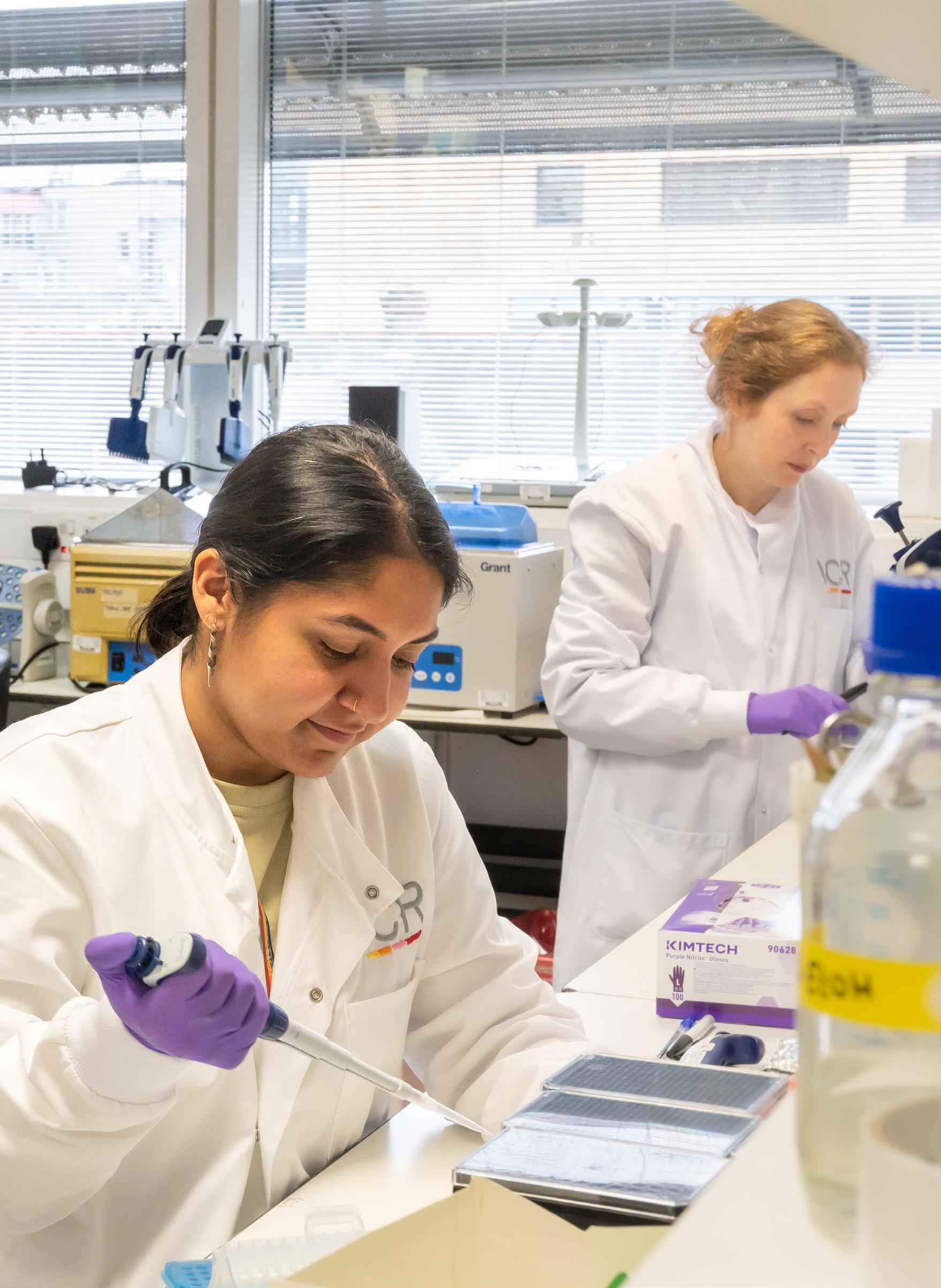
Brain Tumour Research is proud to be joining forces with Leukaemia UK and Sarcoma UK to fight kids’ cancer.
Brain tumours, leukaemia and sarcoma are the most common types of childhood cancer, together representing 78%* of all cancers in children.
Currently, childhood cancers are not well understood. This is primarily because this group of cancers is relatively rare.
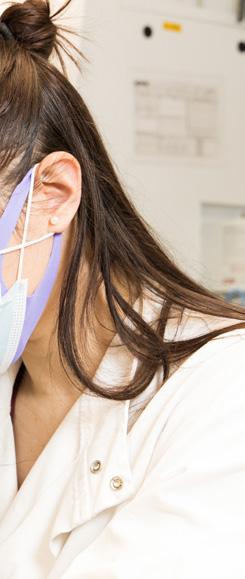
But for those families who receive the news that their child has cancer, it is the most devastating experience. As many readers know all too well, a brain tumour diagnosis is particularly devastating, with brain tumours accounting for one in three childhood cancer deaths.
As charities dedicated to funding pioneering research which will lead to better outcomes and kinder treatments for children with cancer, the we3can collaboration will lead to new opportunities which we cannot access as individual charities.

Working together, we will demonstrate our strength and expertise in research with a particular focus on increasing our eligibility to access high-profile and lucrative funding opportunities and partnerships.

Our vision is to find a cure for all types of brain tumours, including those which affect children. Money raised from this collaboration will be dedicated to funding research into treatments and cures for children with these cancers.

Ashley Bailey, our Interim Chief Executive, said: “We are incredibly proud to announce the we3can collaboration to our community, and we’re looking forward to working alongside Leukaemia UK and Sarcoma UK to further the fight against childhood cancers.

“With brain tumours killing more children and adults under the age of 40 than any other cancer, it is vital that we take every opportunity we can to increase research funding into this devastating disease. Working together we are stronger and this collaboration will increase the money invested into research, bringing fresh hope for families affected by these types of childhood cancer.”
Receive all the latest updates from Brain Tumour Research straight to your inbox: www.braintumourresearch.org/subscribe
Thank you for your support
Our inspiring community finds many creative ways to support Brain Tumour Research, proving every day that fundraising really has no limits.
From community events and fitness fundraising to turning hobbies into cash, it’s always amazing to see the different ideas supporters have to get involved to help find a cure. Here are just a handful of recent examples to inspire you.
Following Simon Penwright’s glioblastoma (GBM) diagnosis in January 2023, his family is “determined” to make a difference for future patients and their loved ones. The Penwrights have raised more than £20,000, including through a sell-out race night attended by an 80-strong guest list, which included a raffle and auction with prizes generously gifted by the community.

Before she passed away in November 2021, Theresa O’Donnell created a bucket list which included activities such as summiting Mount Snowdon (Yr Wyddf) in Wales.
After her death, a group of nine of her ambitious pals completed the Welsh Three Peaks in honour of Theresa, despite having no previous hiking experience, raising more than £11,000


Our vital work is made possible thanks to the amazing efforts of our fundraising community.
If you’re feeling inspired to fundraise your way for Brain Tumour Research, visit our website to get started:
www.braintumourresearch.org/ fundraise-your-way
Tony Hickey and Jo Blair both hit the right note when they turned their musical talents into money. Tony received a letter from King Charles III when he sent him a copy of the CD of easy-listening tracks he is selling with proceeds coming to Brain Tumour Research. It’s inspired by teenager Luke Webber, who lives with the life-changing effects of a craniopharyngioma.

Jo’s album is inspired by her husband Stewart, who was diagnosed with an oligodendroglioma in 2013 and underwent further treatment in 2021 after a scan showed his brain tumour had returned.
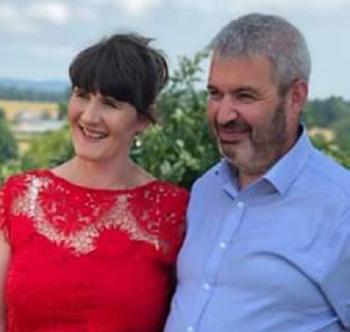
Back on the bike for their second London to Paris cycle this summer was Team Adam. This annual ride raises funds in memory of Adam Bradford, who died from a grade 4 anaplastic oligodendroglioma in 2019. This year, Adam’s dad, David, who has completed the cycle ride six times, decided to step it up a gear, pedalling an extra 340 miles from Newcastle to the start line in London, dropping in to visit our Head Office in Milton Keynes along the way.


Clare Danswan was diagnosed with a dysembryoplastic neuroepithelial tumour (DNET) when she was just 11. Now 27, she braved the shave for Brain Tumour Research, lopping off her long locks to raise more than £600
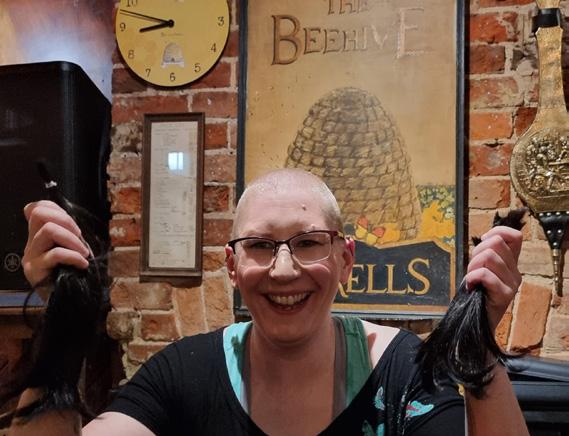

Inspired by his uncle, Paraic Carolan, who died from a GBM in November 2022, 13-year-old Anthony Cawley headed to his uncle’s home town in County Mayo, Ireland, to run 15km. His impressive fundraising was also inspired by schoolfriend George Fox, who died from the same type of tumour in April 2022.
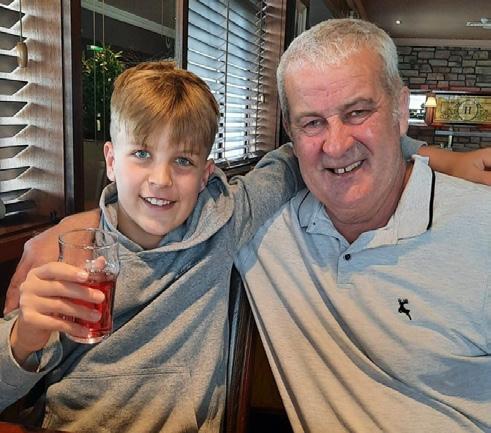
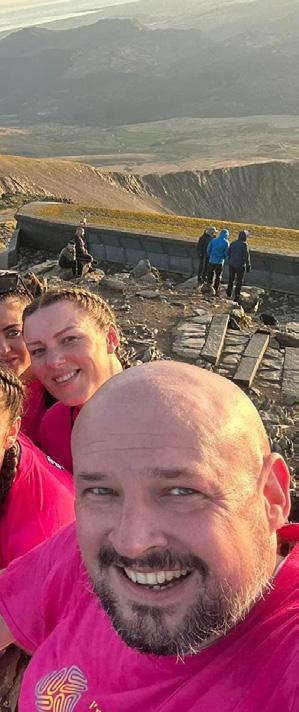
Leaving a gift to charity in your will is one of the best ways to protect the causes you care about. Not only can your legacy look after your loved ones after you are gone, it could help to transform the future of brain tumour research.

As the only national charity in the UK dedicated to raising funds for continuous and sustainable scientific research into brain tumours, Brain Tumour Research is also the leading voice of the UK brain tumour community, calling for greater support and action for research into what scientists are calling the last battleground against cancer.
Your legacy could bring hope of better treatments and outcomes for future families by ensuring the sustainability of our future research programmes, so enabling continuous research, which will lead to breakthroughs, bringing us closer to finding a cure for all types of brain tumours.
Your legacy could support our campaigning for governments and larger charities to invest more in brain tumour research in order to achieve parity with other cancers, such as breast and leukaemia where greater research investment has resulted in better outcomes, giving patients and their loved ones a voice.
Your legacy could play a pivotal role in furthering our mission to increase the national investment in brain tumour research through the funds we invest and how those funds can be leveraged and attract further funding from other organisations.

One in three know someone affected by a brain tumour to continue to fund life-saving research
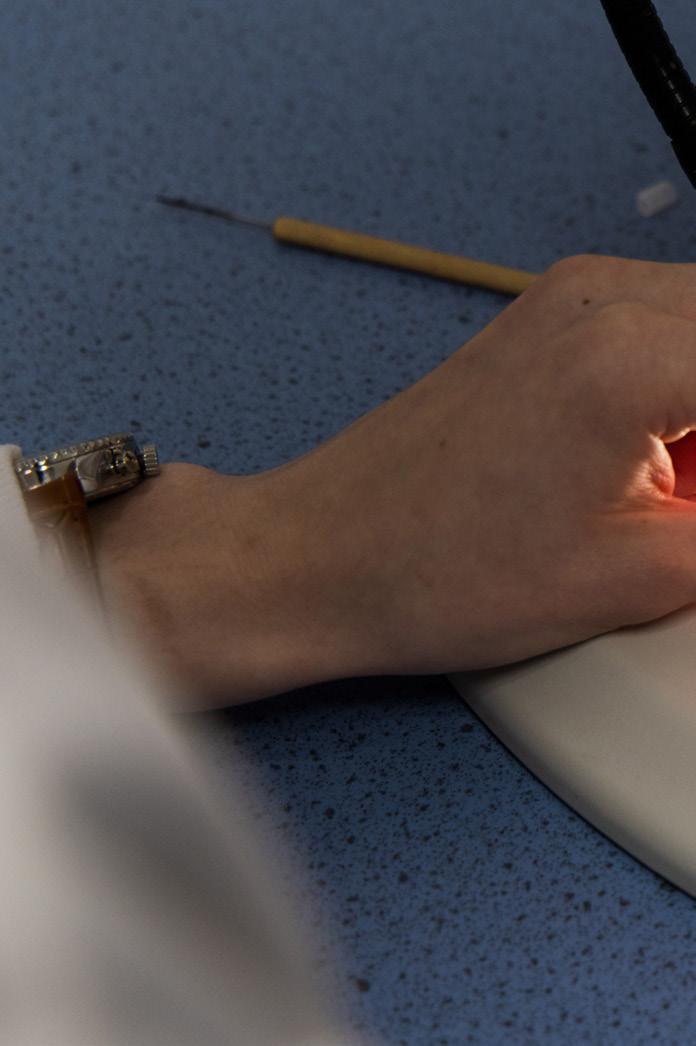
A gift to Brain Tumour Research will make a real difference in years to come, bringing much-needed hope to the one in three people in the UK who know someone affected by this devastating disease.
For every £1 you give, our Centres can generate £3 more, meaning your legacy could be worth four times as much as you leave us.
Russell Marriott, our Director of Income Generation, said: “With more than 60% of UK adults not having a valid will in place, we are asking you to consider what a difference a gift in your will – no matter how large or small – could make.

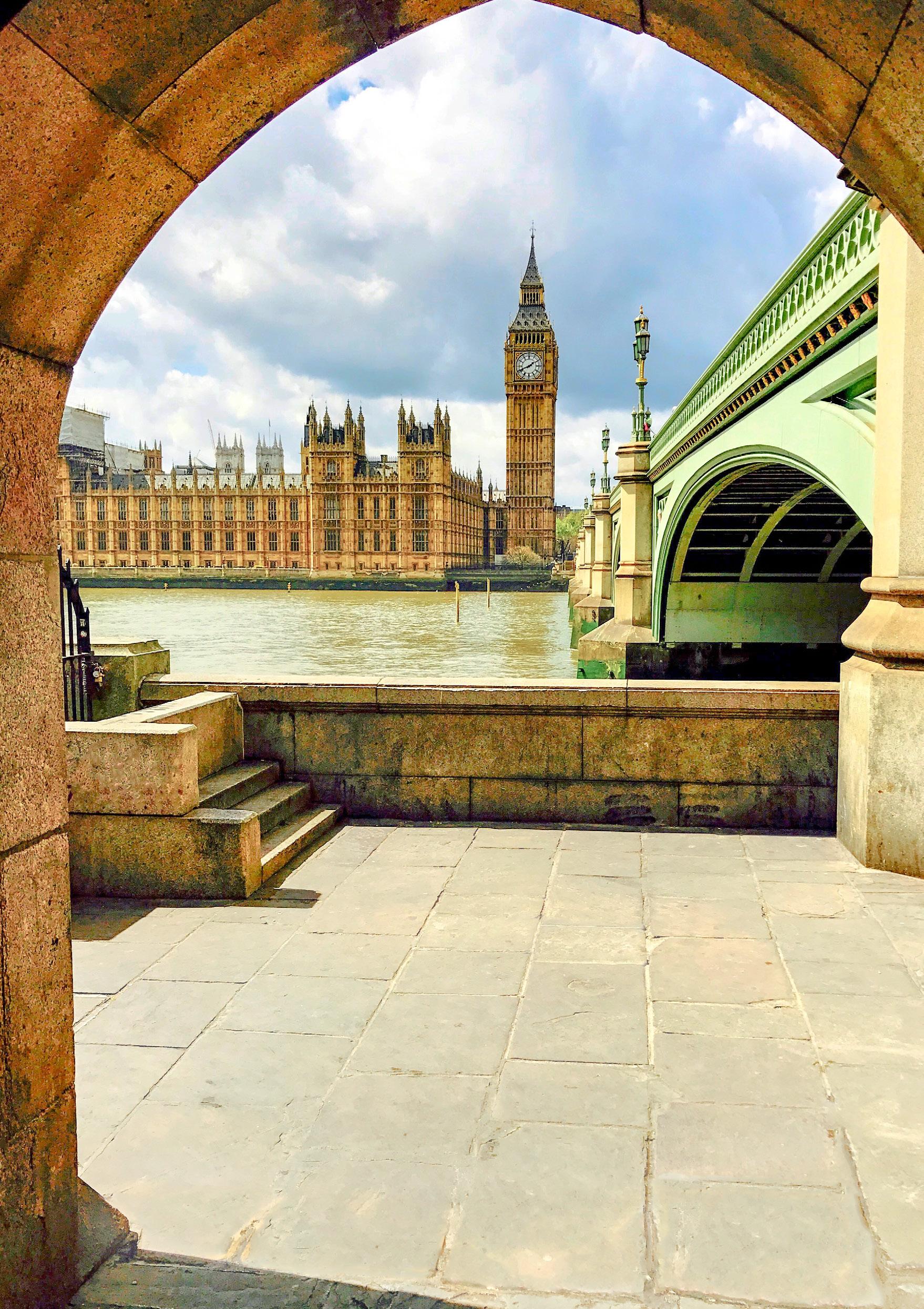
“We are extremely grateful to those who support us in this way. That’s why we’ve teamed up with the National Free Wills Network to provide our supporters with the opportunity to have a simple and uncomplicated will written for free via a local solicitor in their area. There is no obligation to leave a gift to Brain Tumour Research when using this service, however, we would be extremely grateful if you would consider a gift to help sustain our vital work.”
Find out how you could have a will written or updated for free and create a legacy that could make a difference – visit: www.braintumourresearch.org/legacy or email: legacy@braintumourresearch.org

SEPTEMBER Event
Sat 30 th Walk of Hope
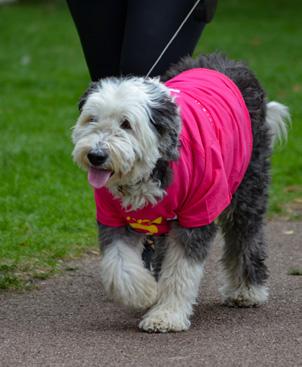

OCTOBER
Sun 1st Cardiff Half Marathon
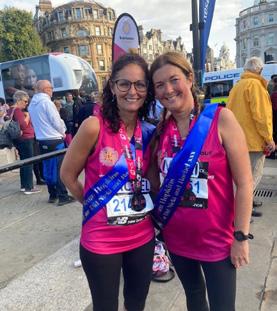
Sun 8 th Forth Bridge Abseil
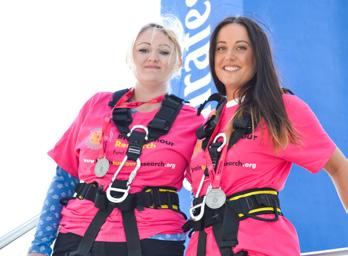
Sun 29 th Dublin Marathon

NOVEMBER
Details
There’s still time to step forward to help find a cure
A fast, flat event round Wales’ capital city
Descend 165ft from this iconic UNESCO World Heritage Site
Join our #FightingForce team at this sell-out event
All month Christmas cards and more Purchase our cards and accessories ready for the big day
All month New challenge
Sat 18 th Bottesford Firewalk

DECEMBER
All month Christmas Appeal
Sun 3rd Liverpool Santa Dash

Fri 15 th Wear A Christmas Hat Day

JANUARY Event
All month Make a Difference in 2024
FEBRUARY
All month 10,000 Steps a Day
MARCH
All month Brain Tumour Awareness Month
Thurs 28 th Wear A Hat Day

Follow us on Facebook to be amongst the first to hear
Our final walk over the coals in 2023 – look out for 2024 dates

Donate in support of our Appeal and remember your loved ones
There’s snow way you’ll want to miss this
Our hattastic fundraiser with added festive sparkle


Details
New year, new you. Decide how you’ll get involved in 2024
The ever-popular challenge returns for a fourth year

A key moment in the brain tumour community’s calendar
Our flagship campaign – how will you get hatty?
Details
Sun 7 th Brighton Marathon Run 26.2 miles along this scenic seafront
Sun 7 th London Landmarks Half Marathon Take in the sights of England’s capital on a route like no other


Sun 14 th Leicester’s Big 10K A flat 10km around Leicester’s Abbey Park
Sun 21 st TCS London Marathon Run for research if you got a coveted ballot place
Sun 28 th Britain’s Ocean City Running Festival Choose from the Plymouth 5k, 10k or Half Marathon
MAY
All month Jog 26.2 Miles Lace your trainers and jog a marathon in a month
Sun 12 th Rob Burrow Leeds Marathon Join our #FightingForce team in Leeds
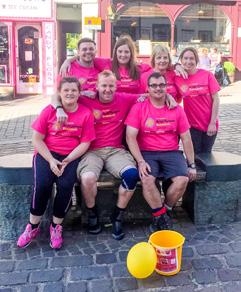
Sat 18 th Yorkshire Three Peaks Summit all three peaks in under 12 hours
Sun 26 th AJ Bell Great Manchester Run Run 10km or a half marathon around the buzzing city centre
JUNE
Sun 2 nd Orsted Great Grimsby 10K A fast and flat route with a great atmosphere
Fri 7 th Arla Great North Swim Make a splash at the UK’s largest open water swim

Sat 8 th Jump for Hope Back by popular demand – take your fundraising to new heights



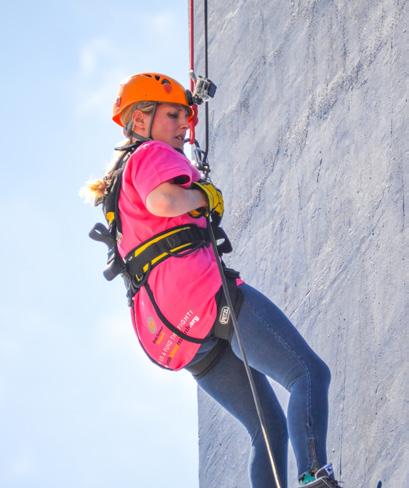

Fri 21 st Wear A Hat Day with Flowers Your chance to add a floral flourish to our hattastic campaign

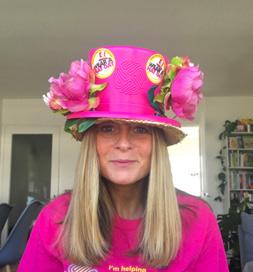

JULY
Sat 6 th Brain Tumour Research Isle of Wight Randonnée Put your pedal power to the test

AUGUST
Facebook challenge Get outdoors and raise vital funds



Tri for Hope
Or do your own thing and fundraise your way for Brain Tumour Research: www.braintumourresearch.org/ fundraise-your-way
Our brand-new triathlon – stay tuned for more

To help us achieve our vision, we’re asking you to consider how your workplace – or that of your family and friends – could support us.

Staycations provider Verdant Leisure has pledged to raise £50,000 during a year-long charity partnership. As part of its busy fundraising calendar, Verdant is planning Walk of Hope events for colleagues and holidaymakers at its 13 holiday parks. Verdant Leisure is also offering our supporters 15% off stays (see advert for more details).

Our flagship campaigns, Walk of Hope and Wear A Hat Day, are great ways to bring your colleagues together to get involved with our cause. Register your workplace and enjoy support from our friendly Fundraising team.


Grant Churnin-Ritchie ran the Leeds Half Marathon for Brain Tumour Research despite having undergone surgery just months earlier. He doubled his total thanks to his workplace, Microsoft, matching his fundraising.

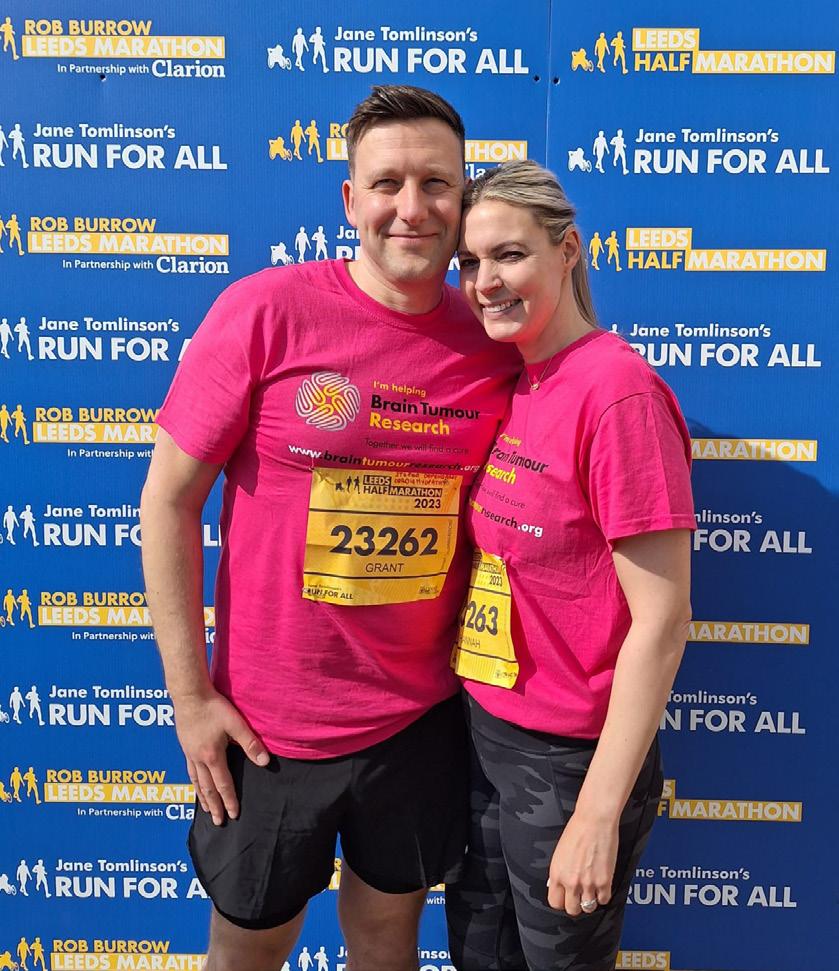
When you fundraise for us, ask your line manager or HR department if your organisation offers match funding or will give a corporate donation in your name. It’s always worth asking as this is sometimes listed as a way to meet corporate social responsibility (CSR) objectives.
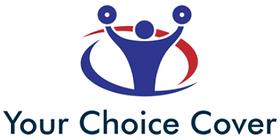
Working together makes us stronger and the more people we can engage in our cause, the closer we will get to a cure for brain tumours.


With one in three people knowing someone affected by a brain tumour, corporate support often results from personal connections to our cause. Your Choice Cover aims to raise £20,000 during a two-year partnership which is inspired by colleague James Drew, whose father-in-law Mark Poulton has a brain tumour.

If you have been affected, put us forward for Charity of the Year opportunities and share what it would mean to you if your workplace could support us in this way.

Having pledged to raise £50,000 during a two-year partnership, West Midlands Trains is encouraging employees to donate extra pennies from their pay cheque through its ‘Pennies from Heaven’ scheme.
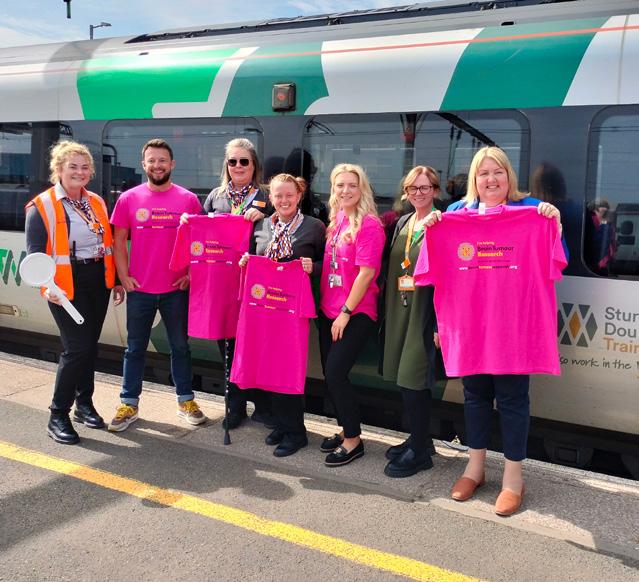

Ask if your employer offers similar schemes or payroll giving – this is a great way to give as you earn and on an ongoing basis.
These are just a few ways your workplace could support our vital work.
Contact our Corporate Development Manager, Matt Howarth, via: matt.howarth@braintumourresearch.org to find out more.
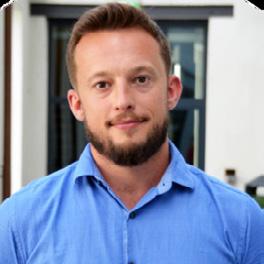 West Midlands Train launching its charity partnership
West Midlands Train launching its charity partnership


Adrenaline-fuelled challenges are a great way to impress your family, friends, colleagues and communities and we are always blown away by how many supporters are prepared to put their bravery to the test to maximise the funds and awareness they raise for Brain Tumour Research.
Brand-new for 2023, we introduced firewalks to our packed events calendar and invited supporters to turn up the heat on their fundraising by walking over burning hot embers reaching temperatures of around 800 degrees.
Amongst those who took up the challenge was Sue Hitchmough, who has undergone three surgeries since she was diagnosed with a low-grade acoustic neuroma in September 2021.
Despite feeling “nervous” ahead of her challenge, Sue conquered the coals and raised more than £1,300. Here at Brain Tumour Research HQ in Milton Keynes, we were proud to say we’re not all talk as many members of the team took part in a firewalk raising hundreds of pounds.



From walking over fire to flying through the air. In June, nearly 50 supporters took part in our Jump for Hope and completed tandem skydives at locations across the UK. This team of high-flying fundraisers raised more than £53,000.

Amongst them was Ned Hilton, who defied the odds to finish his university degree having been forced to take time out of his studies following his diagnosis with a grade 4 medulloblastoma in 2018. He celebrated his amazing achievement by jumping from 10,000 feet and raising more than £2,500 for Brain Tumour Research Ned said: “The feeling of finishing uni has been incredible. With the support of family and friends, I have overcome so much and I feel proud of myself. To top it off with a skydive to raise money for a cause which means so much to me, after everything I have been through, was brilliant.”
Freefall fundraising isn’t for everyone, some prefer to turn their back on danger and abseil over the edge to help find a cure.
Marking a decade since she underwent surgery to remove a brain tumour, Adele Wise was suspended from the Spinnaker Tower in Portsmouth before descending 100 metres to the safety of the ground below.



Adele, who raised more than £750, said: “I always reflect on the anniversary of both my diagnosis and operation. This year I wanted to do something completely out of my comfort zone for such a significant anniversary. I’m petrified of heights, so this was huge for me.”
HELP US
to continue to fund long-term, life-saving research
For the thrill-seekers out there, keep an eye on our website as we regularly add new highadrenaline challenges, but if that’s not your thing, you’ll find lots of other options too.

Join our #FightingForce team today: www.braintumourresearch.org /take-on-a-challenge

A 65-strong team of cyclists proved their pedal power as they took on the sixth annual Brain Tumour Research Isle of Wight Randonnée on Saturday 1st July. Together, they raised an incredible £19,500!
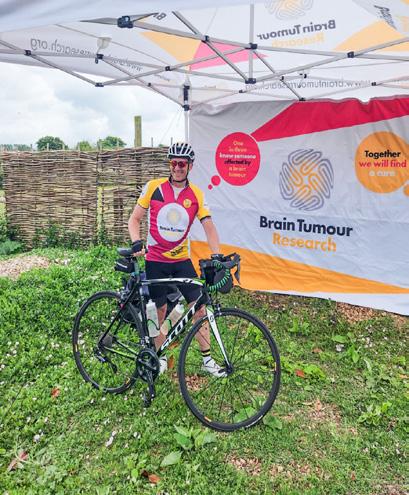



Since the first Randonnée in 2017, the event has gone from strength to strength, raising more than over the years to help fund vital research. It is the brainchild of charity stalwart, Simon Tier, who lost four friends to brain tumours in five years.
This year, the youngest cyclist, at 14 years old, was Faye Withers, who rode alongside her dad Andy in memory of family friend, Simon Oldacres, who died from a brain tumour in 2016. While the award for the oldest cyclist to take part went to 85-year-old Brian Hygate, who pedalled 68 miles.
Special congratulations to Rob Hayward who set off at 8am on the ‘Ultra’ route which saw him cycle two circuits of the island, completing his 136-mile challenge at 9:45pm. Rob’s impressive efforts were in memory of his dad, Barrie.
Our Community Development Manager, Melanie Tiley, said: “We’re incredibly thankful to Simon for continuing to work so closely with us in putting on another spectacular event and to all the cyclists who took part and helped to raise such an incredible total.”
Interested in joining our team? Email our Community Fundraiser, Charlotte James, to register your early-bird interest: charlotte.james@braintumourresearch.org

The seventh annual Brain Tumour Research Isle of Wight Randonnée will take place on Saturday 6th July 2024



Sharon Mynard has finished an epic 2,795-mile virtual journey around the coast of Great Britain, raising nearly £6,000 Brain Tumour Research

Sharon’s wheelchair ‘pushathon’ challenge started on November 2021. Over the course of 18 months, she pushed for an average of 4.5 miles and more than two hours each day, and crossed her virtual finish line on Wednesday 26th July – a significant date as it marked 40 years to the day since Sharon broke her neck in a horse-riding accident, which left her paralysed and confined to a wheelchair from the age of 16.
It wasn’t Sharon’s first fundraising endeavour for Brain Tumour Research. In 2020, she raised more than £12,000 when she completed a wheelchair marathon around the Centre:MK shopping centre. Her support is inspired by her partner, Tim Belfield, who had two low-grade meningiomas removed, and her friend Rory Gilsenan, a fellow equestrian and champion showman, who died from a glioblastoma (GBM) in April 2020.

Sharon said: “Brain tumours are rife, and the fact they’re the biggest cancer killer of children and adults under the age of 40 really gets to me. I want to do what I can to help and will continue

fundraising because the cause is something very dear to me. I’m only one person but every penny helps and, if everybody thinks like that, hopefully we’ll raise even more together.”


Thank you, Sharon, for your incredible commitment to our cause.
Has Sharon inspired you? Let us know how you’d like to fundraise to help find a cure: www.braintumourresearch.org/ get-fundraising
Fundraising in memory of teenager Ollie Gardiner has topped an incredible £200,000. This amazing total has been reached following a generous donation from Ollie’s parents, Jane and Peter, on what would have been his 19th birthday (Tuesday 31st May 2023).
Ollie was 10 when he was diagnosed with a medulloblastoma in 2015. When treatment including emergency craniotomies, chemotherapy and radiotherapy did not stop the cancer, his family, along with friends, launched an appeal among their community to help pay for pioneering treatment which raised almost £500,000.


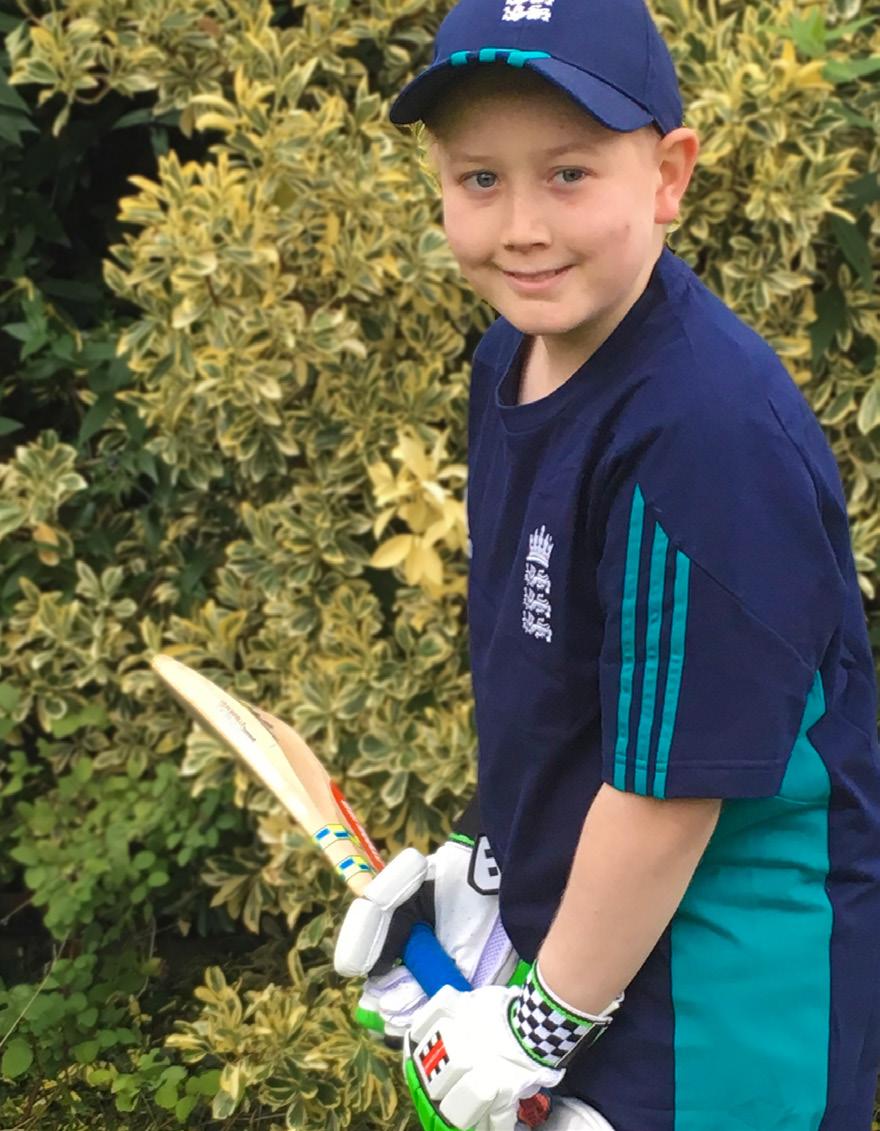
Despite accessing immunotherapy treatment from Germany, Ollie continued to deteriorate. He passed away on 19th November 2017, aged 13.
On the second anniversary of Ollie’s death, in 2019, his family donated £187,000 – the monies remaining from their appeal – to fund Dr Sara Badodi, a postdoctoral researcher at our Centre of Excellence at Queen Mary University of London, who is working in a team developing new treatment strategies to inhibit the progression of aggressive medulloblastoma. Dr Badodi said: “Very rarely does a day go by when Ollie isn’t at some point in my thoughts as I work in our lab. I would have liked to have shown him the work we are doing but now we do it in his memory and I am so thankful to his family for the funding they gave us and the opportunity to learn more about his tumour type that this funding presents.”

Our thanks to the Gardiner family for their continued support.

This North Wales-based Fundraising Group has been set up to create a legacy for Aaron Wharton who passed away in April this year, aged seven.


An only child, Aaron was originally diagnosed with Bell’s Palsy after developing a droop on the left side of his face, being randomly sick and frequently tripping over. It turned out he had a grade 3 anaplastic ependymoma and Aaron spent 10 weeks in hospital, undergoing two surgeries and suffering with meningitis and Posterior Fossa Syndrome (PFS) which affected his speech and ability to swallow.
After completing six weeks of proton beam therapy, Aaron enjoyed his first day at primary school and life seemed to be getting back to normal. In June 2021, however, came the earth-shattering news that Aaron had relapsed and he underwent further surgery.


Despite further operations and chemotherapy, a scan in January 2023 showed significant tumour growth and all treatment stopped. Aaron passed away on 9th April, Easter Sunday with his heartbroken parents by his side.

Mum Nicola said: “I want to carry on Aaron’s fight and determination – which is why I have set up Aaron’s Army to raise funds for Brain Tumour Research. I will speak about Aaron for the rest of my life. His name will live on in me.”
For more information and to join our family of Fundraising Groups, visit: www.braintumourresearch.org/ become-a-fundraising-group
Katie Smith, who set up this Fundraising Group after being diagnosed, aged 30, with an oligoastrocytoma in 2015, led a team of 15, including Frankie the dog, in the Royal Sutton Fun Run 2023. Calling themselves the Pink Mad Hatters and carrying an enormous Brain Tumour Research pink hat which Katie had created along with help from her dad, they couldn’t be missed!


Although the Pink Mad Hatters didn’t complete the 8.5-mile course in the fastest time, their courageous efforts attracted an impressive £1,000 in donations, bringing the Group’s overall fundraising total to more than £65,000.
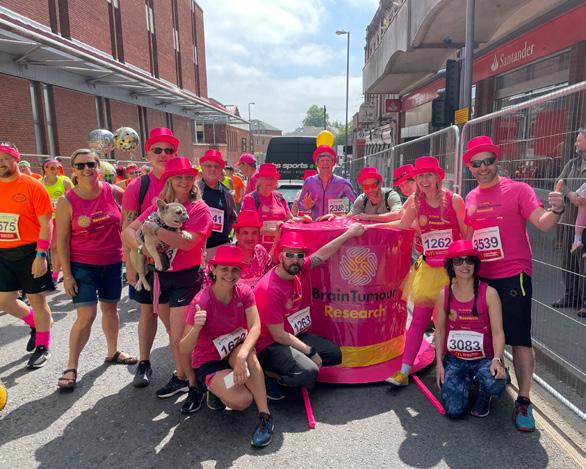
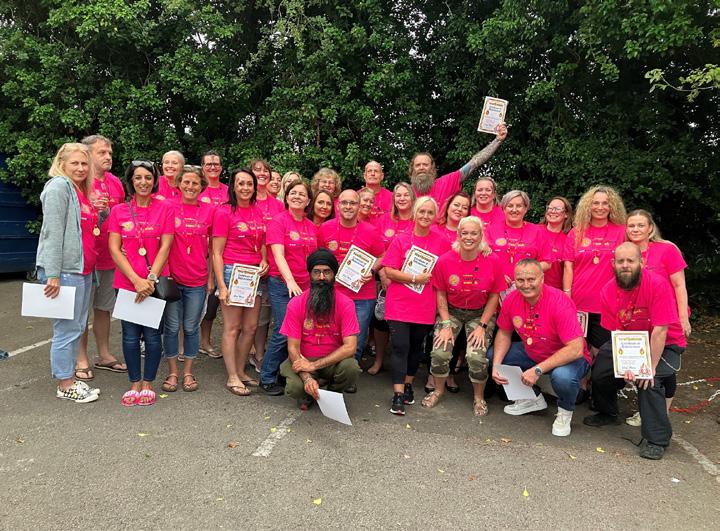

Two of our Fundraising Groups recently helped raise thousands by taking part in our firewalk challenges. Glioblastoma (GBM) patient, Hannah King-Page, was joined by an enthusiastic bunch of 27 friends and family, including husband Andrew, to face the heat near Coventry. While in York, grieving family and friends of Paula Coates lost to a GBM in October last year, conquered the coals. Together, these two adrenaline-charged events raised more than £12,000 to help find a cure.

Neil and Alex Taylor were proud parents when they went to watch their five-year-old daughter take part in the Anita Tymcyshyn School of Dancing’s 50th anniversary charity fundraising production. Annabelle performed a charming Barbie Girl tap routine and, at the end of the show, she and her mum and dad were called up onto the stage and presented with a cheque for £1,500 made out to Brain Tumour Research.

Neil was diagnosed with a grade 3 astrocytoma just months before Annabelle was born, leading him to set up Neil’s Appeal which, with help from #TaylorsWarriors, has raised close to £35,000.

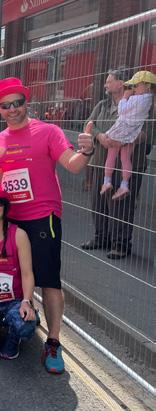
A group of 12 friends and family of Ria Melvin, who passed away aged 25 in 2021 after being diagnosed with a GBM, have taken on a 145-mile cycle ride, raising more than £3,000. This is the second year running that #RiasRiders have cycled from Loughborough University where Ria graduated with a first-class degree in sport and


business management to Ria’s final resting place near Brentwood in Essex.
Ria was passionate about fundraising and campaigning for change and now her mum Carol and sister Kaz are continuing her legacy with fundraising in Ria’s name now incredibly totalling more than £115,000

#RiasRiders ready to set out from Loughborough
To find out more about or to support one of our Fundraising Groups, visit: www.braintumourresearch.org/about/ our-fundraising-groups

To mark the third anniversary of Shay’s death, aged just 13, 66 supporters of the Charity took on the challenge to summit Ben Nevis, the highest mountain in the UK.

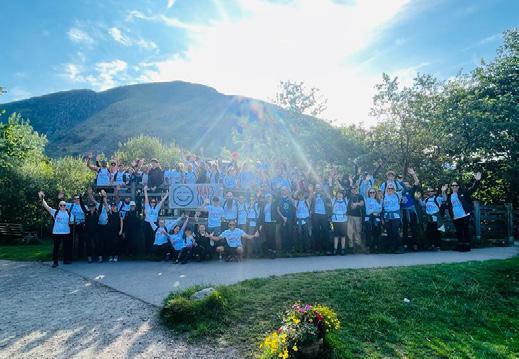
Immediately after the epic feat, Shay’s mum Niki said: “Heading home now, broken and sore, but such a rewarding experience and I know doing it for Shay helped get a lot of the climbers to the top!”
Their combined efforts raised more than £24,000, boosted by the remarkable efforts of two eight-yearold boys, Freddie and Neo, who took on a three-hour dartathon, raising an incredible £938
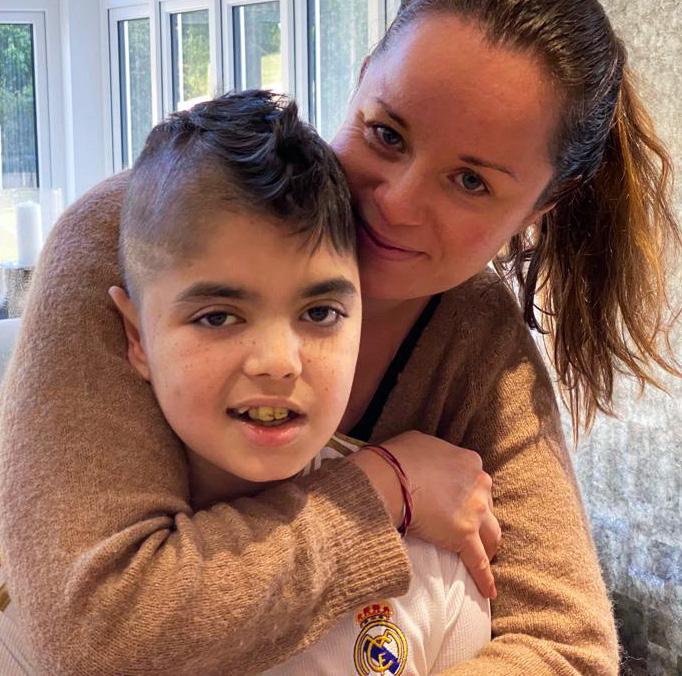

The Charity’s Thrive coaching platform offers ongoing support from a specialist support team, helping brain tumour patients, often completely overwhelmed by their diagnosis, take control of their journey with a specific plan and identified goals.
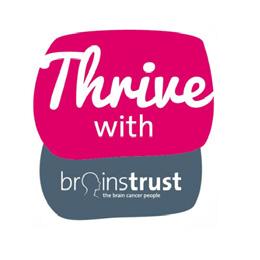
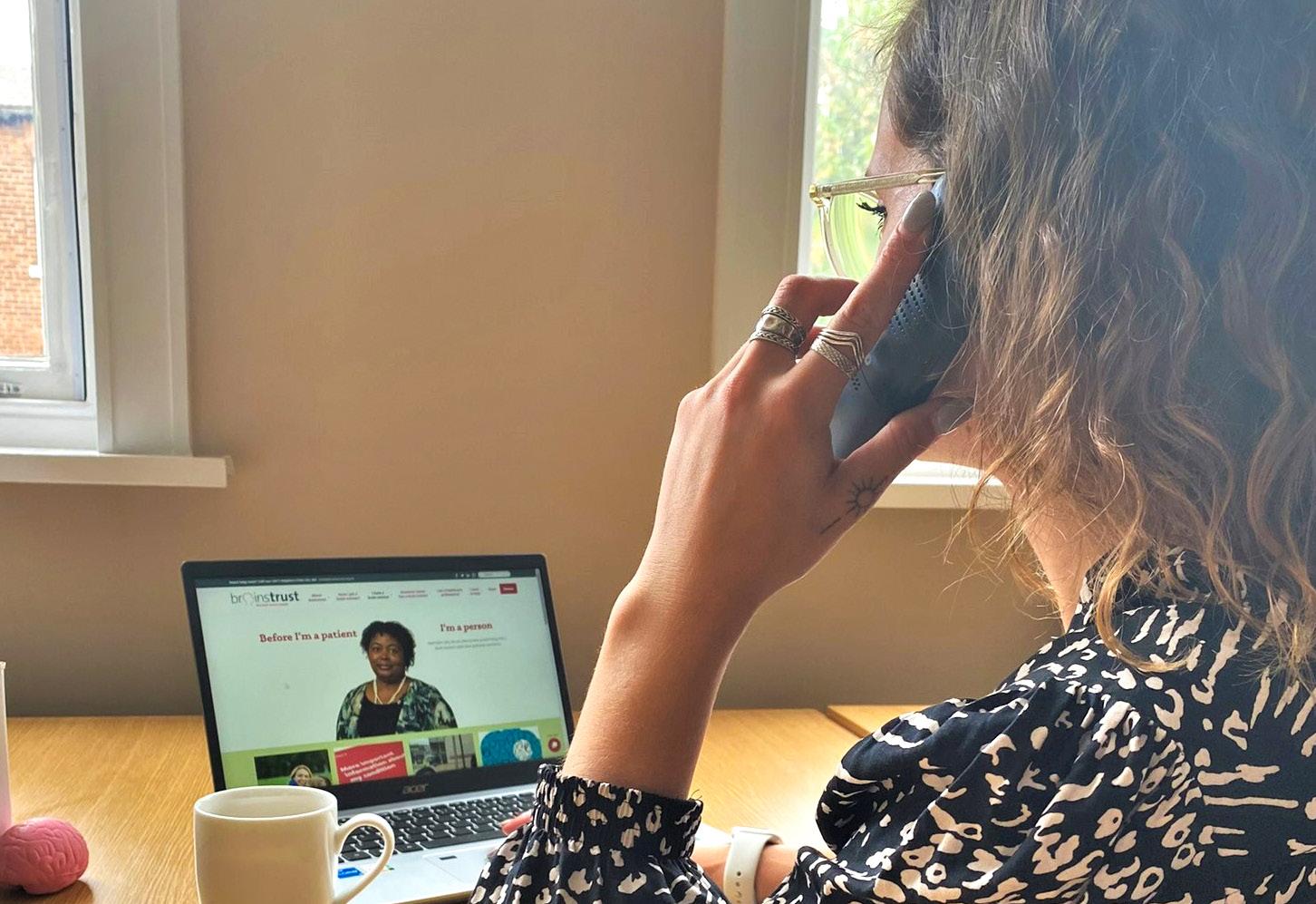
It also allows patients to choose when the sessions take place and what they focus on.
To find out more, or sign up to start your coaching journey, go to www.brainstrust.org.uk/thrive
A number of successful golfing events have taken place and Brainwaves committee member Toni (pictured far left), who works at Safe & Sound Day Nursery, helped organise a sponsored walk for colleagues and children alike which raised a superb £600 Meanwhile, the Charity offers regular support gettogethers and has a plan to fund a further three PhD students later this year at Queen’s University, Belfast.
Congratulations to Charlie’s Challenge as it celebrates 30 years having raised more than £1 million in funds and looks forward to hero and inspiration Charlie Boutwood getting married next year! When he was being treated for a high-grade medulloblastoma in 1993, almost all of the other children diagnosed with brain tumours at his London hospital died.
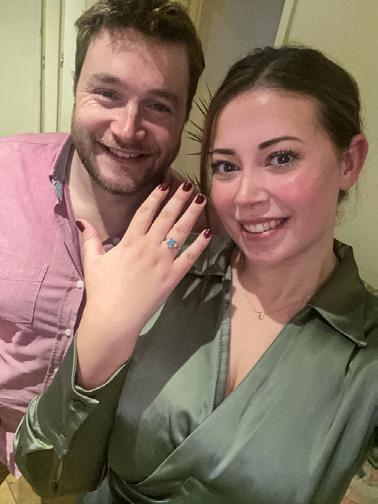
As well as paediatric research, Charlie’s Challenge supports Brain Tumour Research’s funding of BRAIN UK, the world’s first national virtual brain tissue bank.
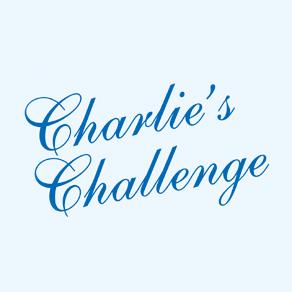
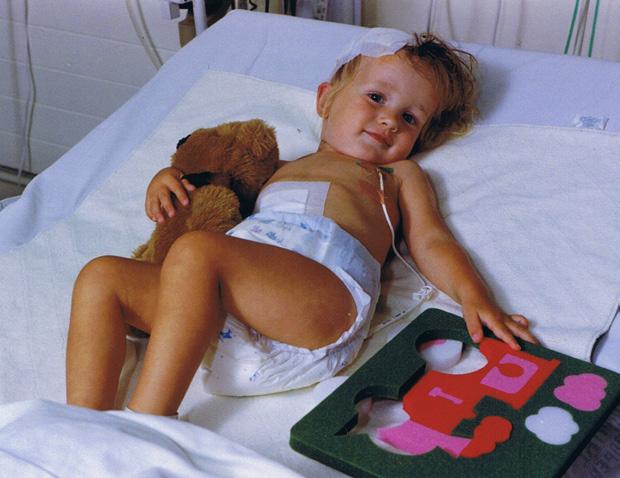

Having completed the Yorkshire Peaks twice, the first time with James and then again after he died, Andy Snow signed up to run The Line 300 –a staggering 300 miles in six days from the Yorkshire coast to Peacehaven on the south coast. His efforts this time raised a massive £1,500 for the Charity.
Meanwhile, Rich Scott led a team of eight in an eye-watering 52 miles in 48 hours running challenge – the equivalent of two marathons –with minimal sleep, raising a fabulous sum of more than £1,700.
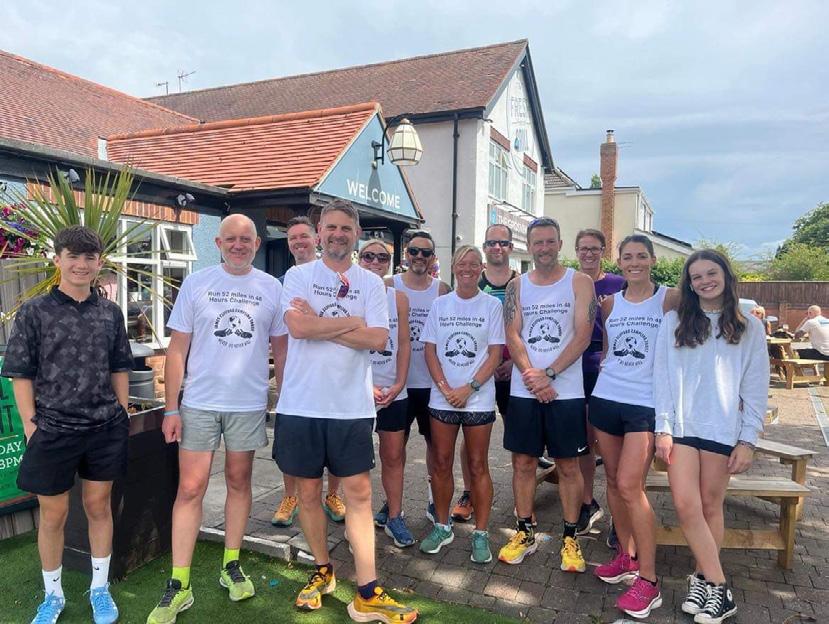

Our collaboration with Member Charities helps bring us closer to a cure, whilst delivering immediate benefit to patients. If you’re interested in joining us, please contact: carol@braintumourresearch.org
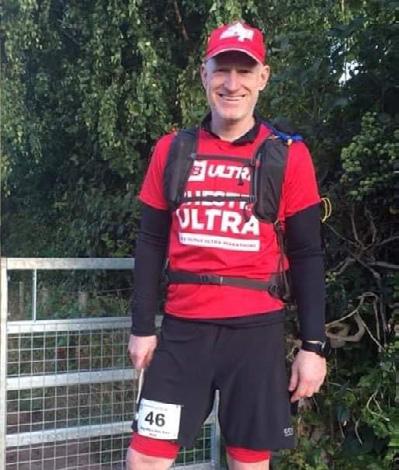 Above: Charlie 30 years ago in intensive care
Right: Charlie with his fiancée Emily
CHARLIE’S CHALLENGE
Above: Charlie 30 years ago in intensive care
Right: Charlie with his fiancée Emily
CHARLIE’S CHALLENGE
Twomarathons in 48 hours challenge to remember James Campling
Ho-ho-hold onto your hats because our winter-wonderful Wear A Christmas Hat Day is back – taking place on Friday 15th December or any day in December that is convenient for you.

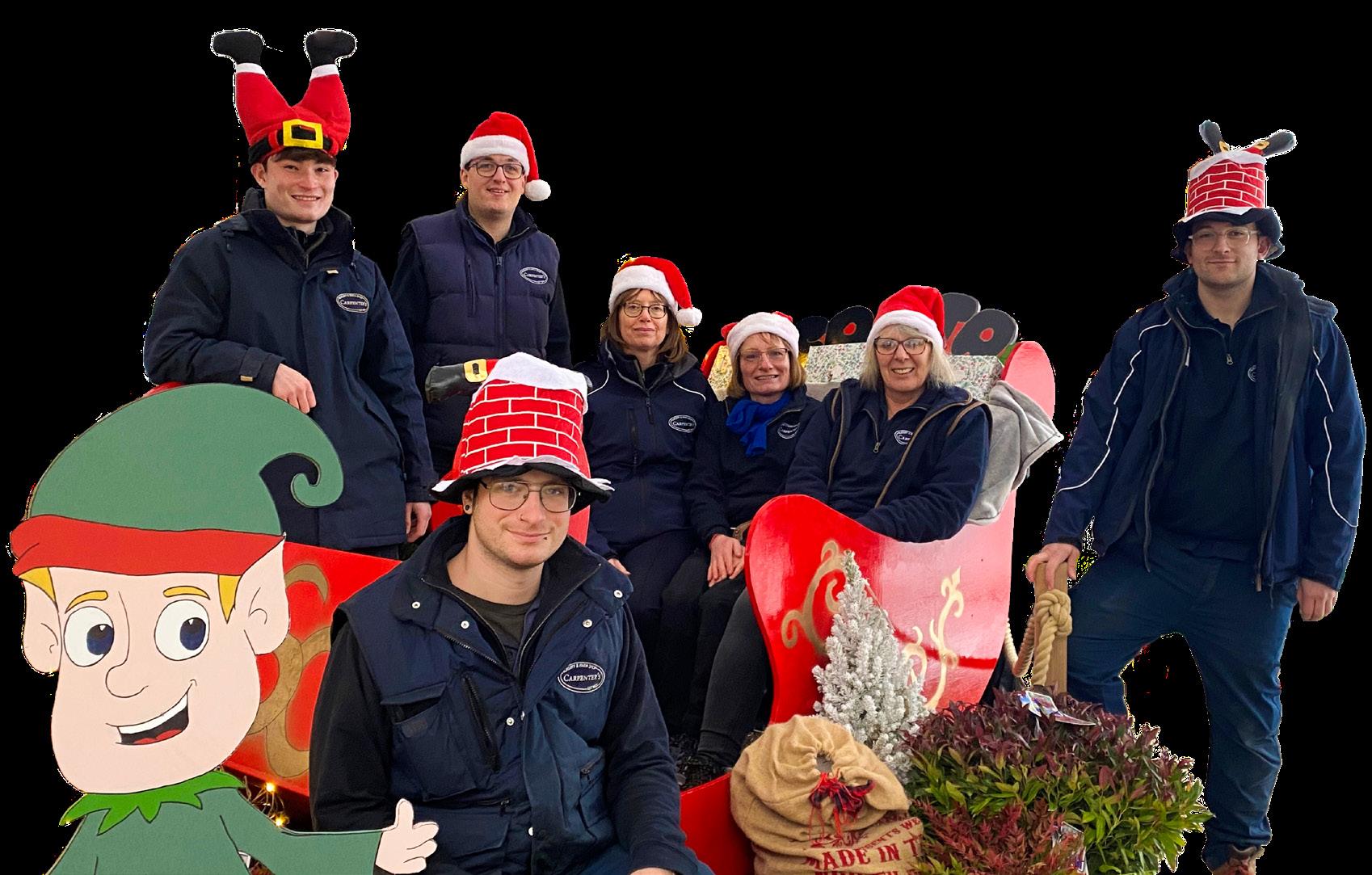
It’s the perfect fundraiser to spread some Christmas cheer and support our vital research and campaigning.
There are lots of ways to get involved at work, at school or in your community, and add a hattastic twist to your festive celebrations.

Taking part could be as simple as wearing a Christmas hat and donating, or you could go bigger and get your workplace, school or community involved too.

There was a flurry of fundraising activity at Carpenter’s Nursery and Farm Shop in Hertfordshire, which was supporting Brain Tumour Research as its Charity of the Year. Staff wore fun, festive hats inspired by local resident, Shay Emerton, who was diagnosed with a grade 2 glioma in April 2021. Shay’s family owns Burston Garden Centre, which also took part in Wear A Christmas Hat Day. The garden centre also presented customers with the perfect photo opportunity, inviting them to take a ride in Santa’s sleigh, made by staff and pulled by life-sized reindeer. And the bow on their fundraising was a festive raffle to win a bumper Christmas hamper, including produce from Carpenter’s farm shop.

Wear A Christmas Hat Day is a wonderful way to give your school’s end-of-term celebrations a holly jolly hattastic twist. Wear hats, hold bake sales, put on fashion or talent shows, organise a hatty disco with all the classic Christmas tunes – whatever you do, it’s a great way to bring pupils, teachers, parents and staff together for an important cause.

At Elmswell Primary School in West Suffolk, more than 300 pupils and teachers wore their festive headgear or made their own and raised nearly £500.

Their fundraising was in support of pupil James Crick, whose younger brother Harry died from a rare brain tumour in October 2021, when he was just two years old. Mum Nelly said James was “really excited” to take part alongside his classmates, adding it gave him a way to remember Harry “in a fun and lighthearted way but all for a very serious cause”.
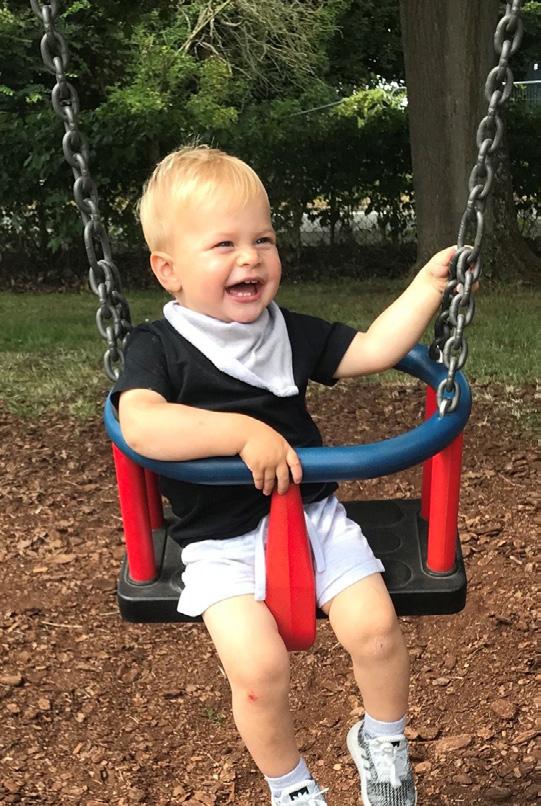
Wear A Christmas Hat Day is also a great way to bring everyone together before Santa Claus arrives in town. Paint the town pink like Beth Harris, who brought her community in Ammanford, Carmarthenshire, together for some epic festive fundraising. Not only did the local rugby team, including Beth’s husband Cellan, look dashing in their pink Santa hats, Beth also got fitness enthusiasts at the Carmarthen and Ammanford Leisure Centre involved, encouraging visitors to wear hats and donate £5, as well as holding a raffle to win a hamper of locally-sourced goodies. Beth’s efforts really paid off, resulting in more than £1,500 raised for Brain Tumour Research

Step into Christmas with our unique fundraiser wherever you are and help find a cure for brain tumours. Register your interest:


The festive season is fast approaching and our Christmas shop has everything you need to prepare for the big day.
Here you can see our broad range of new Christmas cards with carefully selected designs showing a variety of traditional, animal and community themes.
Cards come in packs of 10 and cost £4.50 per pack.
Over on page 40, you can also find more about our wonderful range of Christmas accessories and details about how to place your orders for your Christmas cards and merchandise.

SCAN THE CODE TO
SHOP CHRISTMAS
Visit our online shop to view our full range of Christmas cards shop.braintumourresearch.org/collections/christmas


 Christmas Companions
Christmas Flock
Christmas Companions
Christmas Flock
To order a box of mixed Christmas cards on a sale-or-return basis, call our friendly office team on 01908 867200 or email your request to officemanager@braintumourresearch.org







Could you sell our Christmas cards to family, friends, colleagues, neighbours, at Christmas stalls, village fetes, local markets, or in your school, club, church or workplace to help maximise the funds you raise to help us find a cure?



This year we’ve expanded our range of delightful Christmas accessories, designed to help you make the most of the season while supporting our cause. Choose from attractive gift wrap designs and matching gift tags to finish off your perfect presents, while our sticker sets and Santa kits are brilliant to help children enjoy the season. They’ll also love the classic advent calendars in our collection. And you can add that finishing touch to your Christmas decorations with our fun festive bunting. Why not celebrate Christmas and at the same time help fund vital research by buying and giving one of our Virtual Gifts of Hope? Make your donation and we’ll email you a certificate to print and personalise before giving it to your loved one. Find out more: shop.braintumourresearch.org/ collections/virtual-gifts
Proceeds from sales of all of our Christmas cards and accessories will help to support our mission to increase the UK investment in brain tumour research. Together we will find a cure.

Christmas sticker sheets







Order your favourites by scanning the QR code or visit: shop. braintumourresearch. org/collections/ christmas


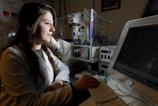

We’re very aware that Christmas can be a difficult time for many people who have been affected by brain tumours, and that many find comfort in finding ways to remember their loved ones, whilst helping others facing a similar situation.







Each year, we offer you the opportunity to support our Hope Tree Appeal, making donations and writing personal messages in memory or in support of loved ones on baubles of hope. Adorning special Christmas trees at each of our Centres of Excellence and our head office, these touching personal messages become powerful beacons of hope, reminding us why we must continue the fight against this devastating disease.
Your donations are vital to help to support the pioneering research being undertaken at our Centres, where scientists are working tirelessly to make the ground-breaking discoveries so desperately needed to improve treatments and outcomes. The money you give also helps us continue our campaigning to keep brain tumours at the top of the political agenda and ensure the voices of patients and families are heard by those with the power to drive real change.
Give your gift of hope today.
After losing someone special, many people look for ways to honour them and we are always touched by those who contact us asking how how their loved one’s memory can help to support our work to find a cure for brain tumours.
Many families find comfort in knowing that their loved one’s legacy is furthering our fight against this devastating disease. We are eternally grateful to all those who donate in memory of a
loved one lost to this devastating disease through funeral donations and by setting up online tribute funds, which are special places to remember and celebrate a loved one’s life.

All contributions make a real difference and form part of their legacy, supporting our work to find better treatments and bringing hope to patients and their loved ones in the future.
We thought of you with love today, but that is nothing new. We thought about you yesterday, and days before that too. You are forever in our hearts.
If you would like to find out more about donating in memory, please visit our website: www.braintumourresearch.org/donation/donate-in-memory
Val Adams
Chris Ansell
Linda Appleford
Gillian
Macalister Bailey
Maurice Bailey
Vera Bainbridge
Johnny Bates
Kenneth (Ken)
Bellwood
Liam Bergin
Kenneth Ronald Bird
Ed Bishop
Robert
John Giles Bloomer
Shirley
Brackenborough
Sheila Brennan
Richard Brophy
Fiona Bunyan
Joan Barbara Burge
Lynda Campbell
Jayne
Elizabeth Chainey
Michael Chapman
Joan Louiza Clarke
Gary Keith Cooper
W Couves
Michael ‘Fish’ Craddock
David Cross
Steve Damaril
Allan James Dean
Joginder Dhillon
Audrey Doran
Peter Dunkley
Samantha Edwards
Julia Engleman
Andrew
Michael John Farrin
Anthony
John Flemington
Nicky Goodman
Ken Gunton
Bernard Guse
John Hale
Kevin Handshaw
Steven Harrold
Kirstin Hart
Gavin Hawke
Alan Hesselden
Pete Hopkinson
Anne Howat
David Howell
Helen Mary Ives
Neil Jackson
Doreen Jean James
Keith James
Jane Jessup
Steven Martin Judd
Marion Karpel
Joseph (Joe) Mark King
Margaret King
Svend-Erik Kold
David Lane
John Lawrence
Stanley William Lewis
Steve Lloyd
Sylvia Kathleen Lock
Edward Lodge
Leslie Marshall
Christopher Martin
Denis McCarthy
Richard McGookin
Ian McLean
Donald Wright Miller
Howard Miller
Margaret Mills
Roger Arthur Mills
Kevin Mole
Christine Moori
Andrew Morris
Yvette Nixon
Laura Nuttall
Paula Orpin
Barbara Pardoe
Christine Peek
Ian Philipson
Phill Piddell
Steven Pinnock
Elizabeth Roberts
David Saxton
Sonia Scott
Lorrain Seekings
Lydia Morgan Sharma
Pamela Smith
Richard Syratt
Richard Taylor
Karen Thorne
Chloe Walker
Anthony Walsh
Dennis Warner
Michael Weaving
David Webber
Stuart
Colin Weetman
Aaron Wharton
Ben Whitehouse
Natalie Whiteside
Celia
Christine Wigginton
Kate Wilkinson
Fiona Willis
Harvey HHH Witzer
Loved ones here include those lost to a brain tumour for whom we received funeral donations between April to July 2023.

Tumour Research, our love and thoughts are with all those who inspire us and with everyone who continues to support us in memory of their loved ones and colleagues, year after year.




